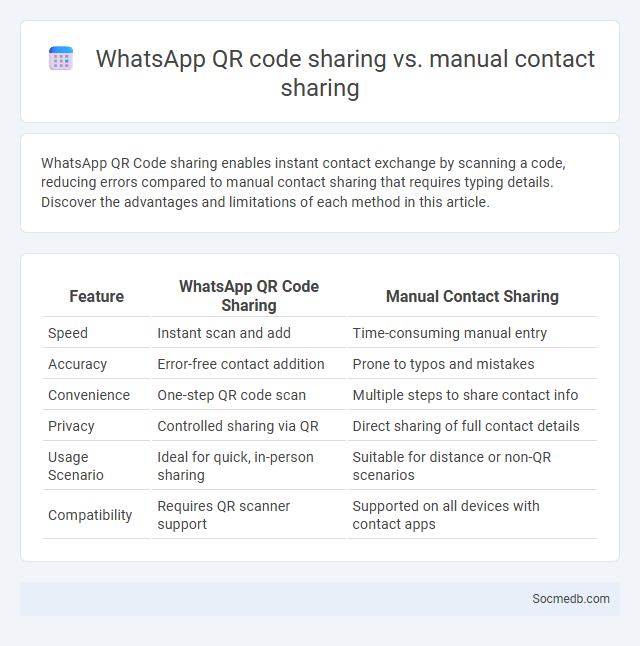
Photo illustration: WhatsApp QR Code sharing vs Manual contact sharing
WhatsApp QR Code sharing enables instant contact exchange by scanning a code, reducing errors compared to manual contact sharing that requires typing details. Discover the advantages and limitations of each method in this article.
Table of Comparison
| Feature | WhatsApp QR Code Sharing | Manual Contact Sharing |
|---|---|---|
| Speed | Instant scan and add | Time-consuming manual entry |
| Accuracy | Error-free contact addition | Prone to typos and mistakes |
| Convenience | One-step QR code scan | Multiple steps to share contact info |
| Privacy | Controlled sharing via QR | Direct sharing of full contact details |
| Usage Scenario | Ideal for quick, in-person sharing | Suitable for distance or non-QR scenarios |
| Compatibility | Requires QR scanner support | Supported on all devices with contact apps |
Introduction to WhatsApp Contact Sharing Methods
WhatsApp contact sharing methods enable seamless communication by allowing you to quickly exchange phone numbers and connect with others. These methods include sharing contacts directly from your phonebook, using QR codes for instant scanning, or forwarding contact info via chat messages. Understanding these options ensures you can efficiently manage and expand your WhatsApp network.
What is WhatsApp QR Code Sharing?
WhatsApp QR Code Sharing enables users to quickly add contacts or join groups by scanning a unique, scannable QR code generated within the app. This feature streamlines the process of connecting on WhatsApp by eliminating the need to manually enter phone numbers or search for contacts. Businesses also leverage WhatsApp QR codes to facilitate seamless customer communication and enhance user engagement.
How Manual Contact Sharing Works on WhatsApp
Manual contact sharing on WhatsApp allows users to exchange phone numbers or contact details by selecting specific contacts from their phone's address book and sending them directly through chat. This process does not require synchronization of contact lists, ensuring privacy and control over which contacts are shared. Once received, the shared contact can be saved by the recipient with a single tap, streamlining communication without exposing the entire contact database.
Contact Sharing via WhatsApp: Step-by-Step
Contact sharing via WhatsApp involves opening the app, selecting the chat or group where you want to share the contact, and tapping the attachment icon. Next, choose the "Contact" option from the menu, select the desired contact from your phonebook, and hit send to share the contact card. This method streamlines communication by allowing instant access to shared phone numbers and contact details within conversations.
Comparing WhatsApp QR Code Sharing and Manual Methods
WhatsApp QR code sharing enables instant and error-free contact exchange by scanning a code, reducing the time and effort required compared to manual methods of entering phone numbers. Manual sharing often leads to typos or delays, whereas QR codes streamline your communication process and enhance user convenience. Utilizing WhatsApp QR codes optimizes social media networking efficiency by ensuring accurate, seamless connections.
Security and Privacy Considerations
Protecting your social media accounts requires strong passwords, two-factor authentication, and careful management of privacy settings to prevent unauthorized access. Sharing minimal personal information and being cautious about friend requests and third-party app permissions help reduce risks of data breaches and identity theft. Regularly reviewing your account activity and privacy controls ensures your online presence remains secure and your personal data stays private.
Speed and Convenience: Which Method Wins?
Social media platforms dominate communication by offering unparalleled speed and convenience, enabling instant sharing of information across the globe. Compared to traditional methods like email or face-to-face meetings, social media interactions reduce response time drastically and facilitate real-time engagement through features like instant messaging and live streaming. The integration of mobile apps and push notifications further enhances accessibility, making social media the preferred method for rapid and convenient communication.
Compatibility with Devices and Platforms
Social media platforms prioritize broad compatibility with devices including smartphones, tablets, desktops, and wearables to ensure seamless user experiences across iOS, Android, Windows, and macOS operating systems. Responsive design and adaptive technology enable social media apps like Facebook, Instagram, and Twitter to function smoothly regardless of screen size or hardware capabilities. Cross-platform integration supports cohesive user interactions and data synchronization, enhancing accessibility and engagement on multiple devices.
Common Issues and Troubleshooting Tips
Social media users often face common issues such as account login problems, privacy settings confusion, and content visibility errors. To troubleshoot these, you should regularly update your app, clear cache, and verify your account credentials to ensure smooth operation. Understanding platform-specific support resources can help resolve these challenges efficiently and enhance your online experience.
Choosing the Best Contact Sharing Method on WhatsApp
Selecting the best contact sharing method on WhatsApp depends on privacy preferences and ease of use. Using the native contact card feature allows users to securely share verified phone numbers with minimal effort, ensuring accurate contact information transmission. Alternatively, sharing via QR codes offers a quick, contactless solution ideal for in-person exchanges, enhancing user convenience without compromising security.
 socmedb.com
socmedb.com